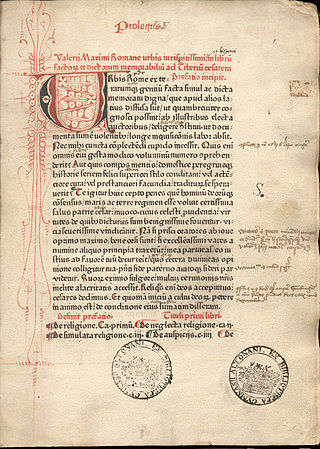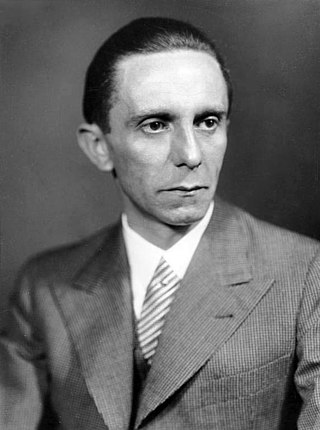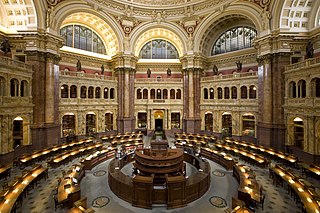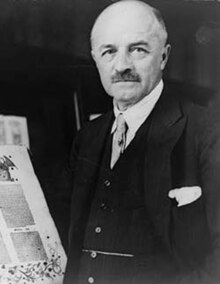
An incunable or incunabulum is a book, pamphlet, or broadside that was printed in the earliest stages of printing in Europe, up to the year 1500. Incunabula were produced before the printing press became widespread on the continent and are distinct from manuscripts, which are documents written by hand. Some authorities on the history of printing include block books from the same time period as incunabula, whereas others limit the term to works printed using movable type.

Triumph of the Will is a 1935 German Nazi propaganda film directed, produced, edited and co-written by Leni Riefenstahl. Adolf Hitler commissioned the film and served as an unofficial executive producer; his name appears in the opening titles. It chronicles the 1934 Nazi Party Congress in Nuremberg, which was attended by more than 700,000 Nazi supporters. The film contains excerpts of speeches given by Nazi leaders at the Congress, including Hitler, Rudolf Hess and Julius Streicher, interspersed with footage of massed Sturmabteilung (SA) and Schutzstaffel (SS) troops and public reaction. Its overriding theme is the return of Germany as a great power with Hitler as its leader. The film was produced after the Night of the Long Knives, and many formerly prominent SA members are absent.

The Nuremberg rallies were a series of celebratory events coordinated by the Nazi Party in Germany. The first Nazi Nuremberg rally took place in 1923. This rally was not particularly large and did not have much impact; however, as the party grew in size, the rallies became more elaborate and featured larger crowds. They played a seminal role in Nazi propaganda events, conveying a unified and strong Germany under Nazi control. The rallies became a national event once Adolf Hitler rose to power in 1933, when they became annual occurrences. Once the Nazi dictatorship was firmly established, the party's propagandists began filming them for a national and international audience. Nazi filmmaker Leni Riefenstahl produced some of her best known work including Triumph of the Will (1934) and The Victory of Faith (1933), both filmed at the Nazi party rally grounds near Nuremberg. The party's 1938 Nuremberg rally celebrated the Anschluss that occurred earlier that year. The 1939 scheduled rally never came to pass and the Nazi regime never held another one as both the government and Nazi Party prioritized Germany's effort in the Second World War over everything else.

Book collecting is the collecting of books, including seeking, locating, acquiring, organizing, cataloging, displaying, storing, and maintaining whatever books are of interest to a given collector. The love of books is bibliophilia, and someone who loves to read, admire, and a person who collects books is often called a bibliophile but can also be known as an bibliolater, meaning being overly devoted to books, or a bookman which is another term for a person who has a love of books.

The German American Bund, or the German American Federation, was a German-American Nazi organization which was established in 1936 as a successor to the Friends of New Germany. The organization chose its new name in order to emphasize its American credentials after the press accused it of being unpatriotic. The Bund was allowed to consist only of American citizens of German descent. Its main goal was to promote a favorable view of Nazi Germany.

Samuel Dickstein was a Democratic Congressional Representative from New York, a New York State Supreme Court Justice, and a Soviet spy. He played a key role in establishing the committee that would become the House Committee on Un-American Activities, which he used to attack fascists, including Nazi sympathizers, and suspected communists. In 1999, authors Allen Weinstein and Alexander Vassiliev learned that Soviet files indicate that Dickstein was a paid agent of the NKVD.

The propaganda used by the German Nazi Party in the years leading up to and during Adolf Hitler's dictatorship of Germany from 1933 to 1945 was a crucial instrument for acquiring and maintaining power, and for the implementation of Nazi policies.

The Nazi regime in Germany actively promoted and censored forms of art between 1933 and 1945. Upon becoming dictator in 1933, Adolf Hitler gave his personal artistic preference the force of law to a degree rarely known before. In the case of Germany, the model was to be classical Greek and Roman art, seen by Hitler as an art whose exterior form embodied an inner racial ideal. It was, furthermore, to be comprehensible to the average man. This art was to be both heroic and romantic. The Nazis viewed the culture of the Weimar period with disgust. Their response stemmed partly from conservative aesthetics and partly from their determination to use culture as propaganda.

George Sylvester Viereck was a German-American poet, writer, and pro-German propagandist. He worked on behalf of Nazi Germany. He preferred to use the name Sylvester.

The Incunabula Short Title Catalogue (ISTC) is an electronic bibliographic database maintained by the British Library which seeks to catalogue all known incunabula. The database lists books by individual editions, recording standard bibliographic details for each edition as well as giving a brief census of known copies, organised by location. It currently holds records of over 30,000 editions.

Ross Alexander Collins was a U.S. Representative from Mississippi.

The Nazi book burnings were a campaign conducted by the German Student Union to ceremonially burn books in Nazi Germany and Austria in the 1930s. The books targeted for burning were those viewed as being subversive or as representing ideologies opposed to Nazism. These included books written by Jewish, half-Jewish, communist, socialist, anarchist, liberal, pacifist, and sexologist authors among others. The initial books burned were those of Karl Marx and Karl Kautsky, but came to include very many authors, including Albert Einstein, Helen Keller, writers in French and English, and effectively any book incompatible with Nazi ideology. In a campaign of cultural genocide, books were also burned en masse by the Nazis in occupied territories, such as in Poland.
Hans Peter Kraus, also known as H. P. Kraus or HPK, was an Austrian-born book dealer described as "without doubt the most successful and dominant rare book dealer in the world in the second half of the 20th century" and in a league with other rare book dealers such as Bernard Quaritch, Guillaume de Bure and A.S.W. Rosenbach. Kraus specialized in medieval illuminated manuscripts, incunables, and rare books of the 16th and 17th centuries, but would purchase and sell almost any book that came his way that was rare, valuable and important. He prided himself in being "the only bookseller in history...to have owned a Gutenberg Bible and the Psalters of 1457 and 1459 simultaneously," stressing that "'own' here is the correct word, as they were bought not for a client's account but for stock."

The Library of Congress (LOC) is a research library in Washington, D.C., that serves as the library and research service of the U.S. Congress and the de facto national library of the United States. Founded in 1800, the library is the United States's oldest federal cultural institution. The library is housed in three elaborate buildings on Capitol Hill. It also maintains a conservation center in Culpeper, Virginia. The library's functions are overseen by the Librarian of Congress, and its buildings are maintained by the Architect of the Capitol. The Library of Congress is one of the largest libraries in the world. Its collections contain approximately 173 million items, and it has more than 3,000 employees. Its collections are "universal, not limited by subject, format, or national boundary, and include research materials from all parts of the world and in more than 470 languages".

The House Committee on Un-American Activities (HCUA), popularly the House Un-American Activities Committee (HUAC), was an investigative committee of the United States House of Representatives, created in 1938 to investigate alleged disloyalty and subversive activities on the part of private citizens, public employees, and those organizations suspected of having communist ties. It became a standing (permanent) committee in 1946, and from 1969 onwards it was known as the House Committee on Internal Security. When the House abolished the committee in 1975, its functions were transferred to the House Judiciary Committee.

Frederick Richmond Goff was an American rare book librarian and specialist in incunabula.

International Publishers is a book publishing company based in New York City, specializing in Marxist works of economics, political science, and history.

Oscar Carl Pfaus was a German immigrant who became an American citizen through military service. He had a succession of jobs before becoming involved in pro-Nazi organizations in Chicago in the early 1930s and becoming a full-time Nazi propagandist there. He was also active in New York.
Simeon Joachimovich Bolan was a Russian-born book dealer in New York, specializing in Russian-language books.
Israel Perlstein was a book dealer specializing in Russian and Slavic materials.

















